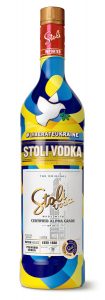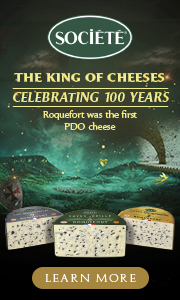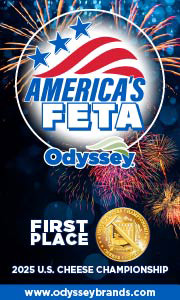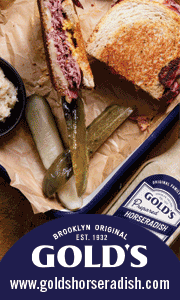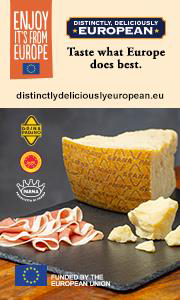Stoli Promotion to Benefit World Central Kitchen for Ukraine Relief
Stoli Group has launched a limited-edition bottle of Stoli Vodka to benefit Ukraine. Proceeds will be donated to World Central Kitchen, a non-profit organization founded by Chef José Andrés that provides fresh, nutritious meals to refugees fleeing Ukraine and those who are staying in cities impacted by the war.
“As Ukrainians continue to suffer unimaginable losses, we are doing our small part to show unequivocal support,” said Damian McKinney, global CEO. “This Stoli Vodka bottle will not only provide financial resources to Ukraine, but is also a symbol of solidarity.”
Drawing from the colors of the Ukrainian national flag, the geometric graphic pattern that adorns Stoli Vodka’s Ukraine limited-edition design is inspired by the communities around the world that have come together to support the people of Ukraine. This special limited-edition will be launched globally as one of the key pillars in reaching the goal of raising $1MM for WCK by Aug. 24 – to celebrate Independence Day of Ukraine.
“World Central Kitchen is grateful for Stoli support and commitment to our mission. They share our belief that a plate of food is more than just nourishment; its hope and a sign that someone cares,” said Jason Collis, WCK’s vice president of relief. “We appreciate Stoli’s quick movement to action and continued support, which will help us to serve meals as long as we are needed.”
WCK has served more than 6 million meals across Ukraine, Poland, Moldova, Hungary, Romania, Slovakia and Spain. Working with local restaurants, caterers, and food trucks to provide nourishing meals at border crossings, shelters, and other refugee communities, WCK serves more than 300,000 meals daily in the region. The limited-edition bottle follows a previous financial commitment to WCK from Stoli.
In addition to the limited-edition bottle, Stoli Group is launching a charitable cocktail program called Cocktails for Ukraine, which encourages bars and restaurants to donate $1 for every Stoli cocktail sold to WCK. Consumers will also have the opportunity to make a direct donation to WCK by scanning the QR code on the menu that links to the Stoli Group fundraising page for WCK – here.
The limited-edition in support of the Ukrainian people will be available for purchase in select stores in the United States and select countries around the world including the United Kingdom, Spain, Italy, Poland, Latvia and Czech Republic.
Headquartered in Luxembourg, Stoli has production facilities in Spain, Italy, Argentina, and the United States, some of which are steeped in history dating back to the early part of the last century. For more information, visit stoli-group.com.
For more specialty food industry news, subscribe to Gourmet News.
San Diego Co. Wine Sales Up 19%, Exceed $44M
The San Diego County Vintners Association, a trade organization dedicated to supporting the winemaking community in San Diego County, released the 2022 San Diego County Economic Impact of Wineries report that shows county wineries realized about $44.1 million in gross sales last year, a 19 percent increase from 2020 but not yet reaching the local winery industry’s all-time-high of sales in 2019 ($46.2 million). The number of active wineries in San Diego County also rose to 160 in 2021.
About 1,370 acres of vines were harvested in the region last year, producing 3,073 tons of wine grapes with a production value of $5.2 million. These figures are down from pre-pandemic 2019 when San Diego County vineyards harvested 3,596 tons of wine grapes, generating a $5.58 million production value, with a sales price of $1,552 per ton, a record amount achieved in the region. About 81% of growers surveyed reported excellent to good harvest quality, the strongest seen since 2016.
The top three varietals produced in the county last year retain their rankings from prior years – Cabernet Sauvignon, Syrah and Sangiovese, respectively, with Grenache and Merlot tied for fourth, and Chardonnay and Petite Syrah tied for fifth. This is the first time that a white wine varietal has appeared in the top five for regional varietals.
“Our wine industry continues to make great strides, especially in North County. I was a big supporter of keeping wineries open during the pandemic to keep these small businesses afloat. Local wineries are thriving despite the last few years of uncertainty, creating jobs, attracting tourism, and providing an important cultural industry in the county. It’s impressive,” said San Diego County Supervisor Jim Desmond.
Written by Vince Vasquez, independent economic analyst and executive director of the Policycraft Institute, the report relies on winery survey data, economic modeling software, California ABC licenses, and County records to calculate the economic health of the San Diego County wine industry.
“San Diego County is blessed to have outstanding wineries and dedicated vintners making a positive impact on our local economy. I am proud to represent many fantastic wineries in my district, whose exquisite grapes and exceptional service continue to put San Diego County on the map in the wine-making industry. By offering beautiful vineyards and delicious wines for all to enjoy, San Diego County’s wineries not only strengthen our economy, they build community,” said San Diego County Supervisor Joel Anderson.
The 160 active wineries in San Diego County today represent a 6 percent year-over-year increase. This figure is nearly twice the total number of wineries in neighboring Riverside County (87).
“San Diego County’s wine industry continues to make important contributions to our economy, history and culture. Our 200-year history of harvesting local grapes has promoted new job creation, amazing food, and entertainment venues as well as cultural amenities. As a member of the Assembly Select Committee on Wine, I am excited to advocate on behalf of our vibrant grape growing industry!” said California Assembly Member Marie Waldron.
For more updates on the specialty food industry, subscribe to Gourmet News.
Guru Plant-Based Drink to Launch Campaign Across Canada
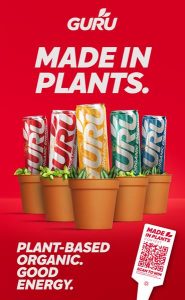 Montreal-based Guru Organic Energy Corp., Canada’s leading organic energy drink brand, announces the launch of “Made with Plants,” a national campaign that highlights Guru ’s exclusive market position as the only plant-based drink in its category and introduces Guayusa Tropical Punch to Canadians from coast to coast after its successful launch in Quebec in late 2021.
Montreal-based Guru Organic Energy Corp., Canada’s leading organic energy drink brand, announces the launch of “Made with Plants,” a national campaign that highlights Guru ’s exclusive market position as the only plant-based drink in its category and introduces Guayusa Tropical Punch to Canadians from coast to coast after its successful launch in Quebec in late 2021.
Developed in collaboration with Sid Lee, the six-week integrated, omnichannel campaign will kick off at the end of March. It features Guru’s full lineup of plant-based drinks (Original, Lite, Matcha, Yerba Mate and Guayusa Tropical Punch) and focuses on one of Guru’s key differentiators: its entirely plant-based and organic list of ingredients. The campaign will also be supported by the first large-scale in-store activation program, with the support of Guru’s exclusive Canadian distributor.
“Made with Plants is a bold campaign that introduces Guru’s better-for-you products to consumers across Canada and marks the beginning of the next phase of our ambitious Canadian growth plan. This campaign puts forward a fresh take on how natural, plant-based energy can fuel a healthy and active lifestyle. With the objective of creating awareness, encouraging trial, and reinforcing the fact that Guru is the better-for-you option in the market, the campaign builds on Guru’s momentum as the fastest-growing organic energy drink in Canada in the last 52 weeks,” said Carl Goyette, president and CEO, citing Nielsen data.
 “This campaign also marks the national launch of our most recent innovation, Guayusa Tropical Punch. The first phase of its launch in Quebec was a huge hit, with Guayusa now ranking as the #6 energy drink in Quebec’s convenience and gas channel and as the industry’s top innovation both in 2021 and 2022-to date,” Goyette said, again citing Nielsen data.
“This campaign also marks the national launch of our most recent innovation, Guayusa Tropical Punch. The first phase of its launch in Quebec was a huge hit, with Guayusa now ranking as the #6 energy drink in Quebec’s convenience and gas channel and as the industry’s top innovation both in 2021 and 2022-to date,” Goyette said, again citing Nielsen data.
Recent internal data shows Guru products’ weighted distribution at over 90 percent in the convenience and gas channel, and over 50 percent in the grocery, drug and mass channel in Canada (excluding Quebec), supporting this major marketing initiative. The campaign will include a comprehensive mix of out-of-home banners, digital and print content on leading platforms, partnerships with select influencers, in addition to sampling events and activations in major cities across the country.
To stay updated on specialty food industry news, subscribe to Gourmet News.





